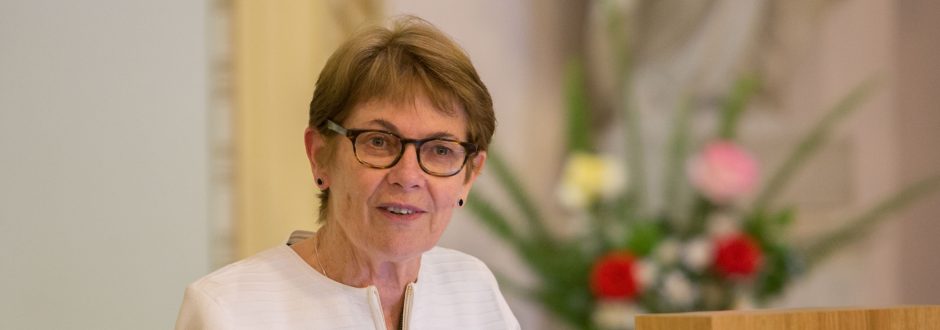Sister Patty Fawkner, Congregational Leader of the Sisters of the Good Samaritan, offered the following reflection to those gathered in Sydney on the Feast of All Benedictine Saints (November 13).
The Rule of Benedict is acknowledged as a 1,500-year-old spiritual classic. Then why does Benedict seemingly waste time writing a chapter on how to answer a door? As always with Benedict, there is profound meaning in the ordinary.
First, I should acknowledge it is the Abbot in Benedict’s Rule that has been taken as a model of wise leadership. However, I wish to reflect on the Porter and aspects of leadership. The Porter would have to be one of my favourite characters in Benedict’s Rule.
“Thanks be to God” is the Porter’s spontaneous and somewhat quaint response, whenever someone knocks on the door. The porter doesn’t say, “Darn! Too late, we’re closed, we’re too busy with the important work of praying or eating or our community responsibilities”.
No. Benedict’s Porter reminds me that any time is the time for interruption, any time is the time to be disturbed and also any time is the time to be surprised, often delightfully so. How much like the Porter I wish I was, that when the knock at the door comes, my response can be a genuine, “Thanks be to God”.
There is a Porter or a would-be Porter in all of us.
The Porter is old. Some of us can tick that one. We have had 13 elected Good Samaritan superiors and I am the oldest when first taking up this role, an average of 10 years older than my predecessors.
Where contemporary culture disparages the aged and the phrase “old woman” is, more often than not, used pejoratively, Benedict equates age with wisdom, capacity and maturity – for this we can but pray! The Porter is called to ministry not despite his age, but because of his age.
It’s a bit of an in-joke among the Sisters, that Good Samaritans never retire. I think it was a former leader, Helen Lombard, who first said that. Helen was not advocating a culture of workaholism – far from it. What she and the Porter teach us is that the Good Samaritan mission of seeking God and being a good neighbour never ceases – even to our last breath. The neighbour might literally be the person in the house next door. It is also the family or community member, the colleague, the refugee, the resident in my aged-care facility.
The Porter is no lone-ranger. If he needs help he is given younger members to help. I am grateful for the members of my Council, three of whom who are younger than I, who will assist and advise me in this ministry of congregational leadership.
The Porter is efficient. Tick. I value efficiency and people often tell me that I am very well organised. How damning it would be to have inscribed on your tombstone, “She was efficient”. Efficiency demands that tasks are completed, work is done. And there is good work, important work to be done. But it is always HOW tasks are done that people remember. The Porter’s “how” is instructive. He responds in the moment with gentleness, warmth and love. He does not roam about. He doesn’t allow himself to be distracted with his devices; he is present, to the task at hand, and more so to the person in front of him.
“Your blessing please,” begs the Porter. You are a blessing, whoever you are. You are a gift to the community. Can we, like the Porter, honour the sacredness in each other and never see the other as a commodity, as a means to an efficient end? Can I truly interact with all and sundry and say, “Come and bother me with the blessing you are”.
The Porter opens the door to the outside world, thanks God for that world, and asks a blessing from that world. He has to listen to the pulse of that world, to be informed, to be connected, or in Vatican II-speak, to read and respond to the signs of the times. The Porter reminds us that any dichotomy between the sacred and the secular, between religion and real humanity is a false dichotomy. “The world is crowded with God,” says C.S. Lewis. “God walks everywhere incognito.”
Benedict’s Porter, as does Pope Francis, privileges the poor, without a skerrick of patronising condescension. In the spirit of the Porter, how might the Australian Government give welcome when the asylum seeker knocks? How might our nation respond when our Indigenous sisters and brothers cry out for recognition in our Constitution? In the spirit of the Porter, how might our Church respond, when remarried divorcees, and peoples of diverse sexual orientation and gender-identity genuinely wish to participate fully in the Church’s sacramental life?
The Porter is a good model for us as we live into our freshly-minted Statement of Directions. You can see this on the back of your booklet. In this statement we say we commit ourselves to nurture a culture of mutuality. We commit ourselves to embrace God’s mission in partnership. Our Statement calls us to foster ecclesial community and stand with our bruised and grieving Church. Our beautiful but precarious home, planet earth, urgently begs our commitment to ecological conversion. You can see that the connecting theme in this Statement is relationships! It’s all about webs of relationships – relationship being the only authentic spiritual path.
An earlier draft of this Statement began with “As Good Samaritan Sisters, we listen to the Spirit calling us to…” But then we realised, “no”, it can’t just be Sisters. We can’t be a closed institution – not that we have ever been. We need porous boundaries if we are to embrace God’s mission, not only in partnership but with real companionship with our colleagues, oblates, friends, fellow religious – that is, with each of you. We gather here in communion together. That is why, with great joy, I say, “Thanks be to God. Your blessing please.”
Sister Patty Fawkner was elected Congregational Leader of the Sisters of the Good Samaritan of the Order of St Benedict in September 2017. This reflection was delivered at St Scholastica’s Chapel, Glebe, in Sydney, on the Feast of All Benedictine Saints, November 13, 2017.


